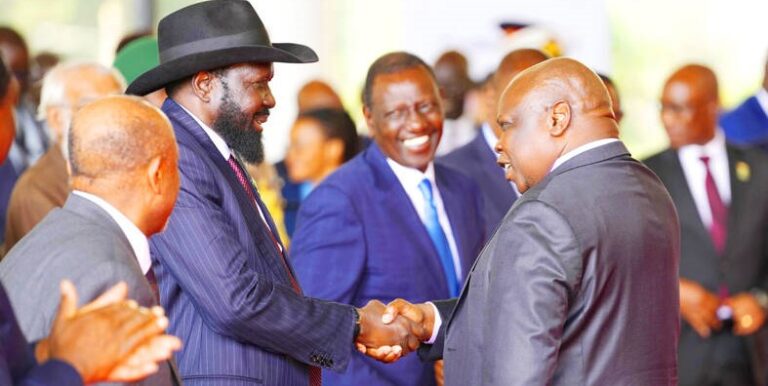A senior member of the holdout opposition group at the Kenya-led Tumaini Initiative talks for South Sudan has warned that the process risked collapse because of sabotage by top government officials.
The Chairman and Commander-in-Chief of the South Sudan People’s Movement/Army (SSPM/A), Gen Rolnyang Buoy, told Radio Tamazuj on Friday that the Nairobi initiative would collapse if Cabinet Affairs Minister Martin Elia Lomuro, the presidential security advisor and other officials, who are members of the 2018 peace deal implementation committee, were not brought under control.
“The Initiative will definitely die if Martin Elia Lomuro, Tut Gatluak, and Puot Kang of the SPLM-IO, among others, who call themselves the High-Level Committee for the Implementation of the 2018 Peace Agreement, are allowed to have a free rein,” he said.
“The Tumaini Initiative has come up with 8 protocols, including the extension of the Revitalized Government for 36 months. Still, because the so-called High-Level Committee did not want to hear anything that could come out from the Tumaini Initiative, they rushed to influence the Presidency to extend the government for two years without waiting for the final outcome,” he added.
Buoy said the government delegation to the Tumaini Initiative that went to Juba on August 30 had been blocked by the Committee from briefing the President, for him to give permission for the signing of the final peace agreement.
“Now, the High-Level Standing Committee is set to come to Nairobi this weekend to meet President William Ruto and the mediation team, leaving behind the government delegation that negotiated the talks with the opposition in May 2024 to make changes in the already initialed protocols and to annex the Tumaini to the R-ARCISS, which is already dead. They still keep it as their old testament which indicates that Juba is not for peace and was applying delaying tactics anyway anyhow,” he said
“We remain with the ninth protocol about responsibility sharing, which is the reason for the return of the government delegation to Juba to consult, and we expect them to come back to sign the final agreement,” he added.
Buoy, however, noted that not all government officials in Juba were opposed to the Tumaini Initiative.
“Tut and Elia are opposed to the Tumaini Initiative simply because of the National Transitional Committee (NTC), which it replaced with the National Implementation Oversight Commission (NIOC), to be led by the opposition and deputized by the RTGoNU, because NTC had failed to implement the R-ARCSS,” he claimed.
On whether he was ready to go back to Juba and work with President Kiir and other officials, he said: “If Riek Machar could work with President Kiir, what would prevent me from working with President Kiir? I will go to Juba to work with anyone who humiliated me and forgive them because they will be the ones with guilt.”
Members of the National Transitional Committee (NTC) led by Presidential Advisor Tut Gatluak could not immedidiately be reached for comment.
The Kenya-led peace talks started in Nairobi on May 9 but halted in July after representatives of the Sudan People’s Liberation Movement-in-Opposition (SPLM-IO) led by First Vice President Dr. Riek Machar walked out.
Dr. Machar argued that the protocols signed in Nairobi would undermine the provisions of the 2018 peace deal. Officially known as the Revitalized Agreement, it was signed between President Salva Kiir’s SPLM and SPLM-IO and other political factions.
The negotiations in Nairobi were meant to bring in opposition groups that had stayed away from the 2018 peace deal. The opposition groups who are part of the Tumaini Initiative include the Real-Sudan People’s Liberation Movement led by Pagan Amum , the South Sudan United Front led by Paul Malong Awan, the former chief of staff of the South Sudan People’s Defense Forces (SSPDF) and the South Sudan People’s Movement/Army (SSPM/A) led by Gen. Stephen Buoy Rolnyang.




